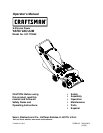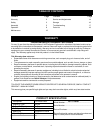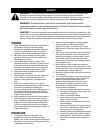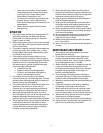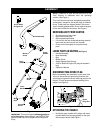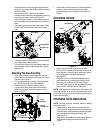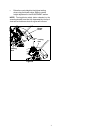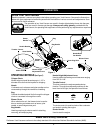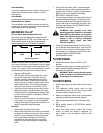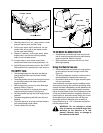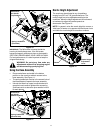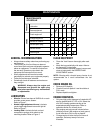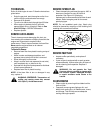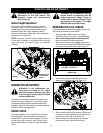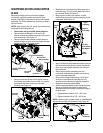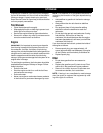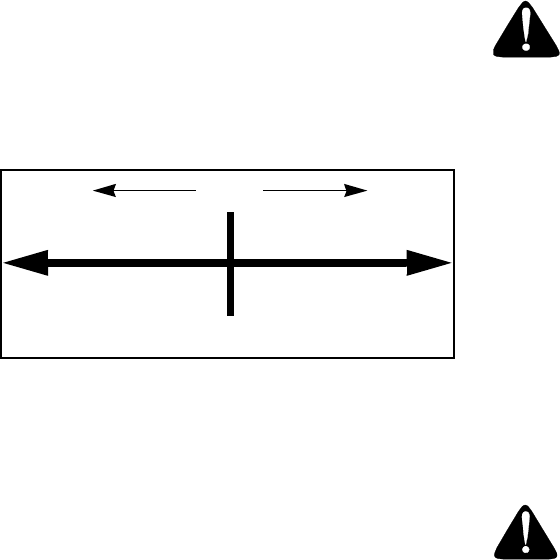
9
Hose Assembly
Used as an alternative to the nozzle to vacuum yard
waste such as leaves or pine needles in hard to
reach places.
Hose Handle
Used to guide hose assembly when vacuuming.
Nozzle/Hose Vac Handle
The nozzle/hose vac handle is located on top of the
nozzle and it is used to regulate the vacuum between
the nozzle and the hose assembly.
GAS AND OIL FILL-UP
Oil (one 20-oz. bottle shipped with unit)
Only use high quality detergent oil rated with API
service classification SF, SG, or SH. Select the oil’s
SAE viscosity grade according to the expected
operating temperature. Follow the chart below.
NOTE: Although multi-viscosity oils (5W30, 10W30,
etc.) improve starting in cold weather, they will result
in increased oil consumption when used above 32°F.
Check your engine oil level more frequently to avoid
possible engine damage from running low on oil.
• Remove oil fill dipstick.
• With the Yard Vacuum on level ground, use a
funnel to fill engine with oil to FULL mark on
dipstick. Capacity is approximately 20 oz. Be
careful not to overfill. Overfilling will cause the
engine to smoke profusely and will result in poor
engine performance. The oil bottle packaged
with your Yard Vacuum contains 20 oz. of oil.
• Check the oil level making certain not to rub the
dipstick along the inside walls of the oil fill tube.
This would result in a false dipstick reading. Refill
to FULL mark on dipstick, if necessary. Replace
dipstick and tighten.
• Check oil level three times prior to starting engine
to be certain you’ve gotten an accurate dipstick
reading. Running the engine with too little oil can
result in permanent engine damage.
Gasoline
• Remove fuel cap from the fuel tank.
• Make sure the container from which you will pour
the gasoline is clean and free from rust or foreign
particles. Never use gasoline that may be stale
from long periods of storage in its container.
Gasoline that has been sitting for any period
longer than four weeks should be considered
stale.
Warmer
Colder
32
°
F
5W30 SAE 30
Oil Viscosity Chart
• Fill fuel tank with clean, fresh, unleaded regular,
unleaded premium or reformulated automotive
gasoline only. DO NOT use Ethyl or high octane
gasoline. Do not use gasoline containing
METHANOL. Replace fuel cap.
• To avoid engine problems, the fuel system should
be emptied before storage for 30 days or longer.
Drain the gas tank, start the engine and let it run
until the fuel lines and carburetor are empty. Use
fresh fuel next season. See STORAGE section
for additional information.
WARNING: Use extreme care when
handling gasoline. Gasoline is extremely
flammable and the vapors are explosive.
Never fuel machine indoors or while the
engine is hot or running. Extinguish
cigarettes, cigars, pipes, and other
sources of ignition.
• Check the fuel level periodically to avoid running
out of gasoline while operating the Yard Vacuum.
If the unit runs out of gas as it is chipping, it may
be necessary to unclog the unit before it can be
restarted. Refer to SERVICE AND
ADJUSTMENT section.
TO STOP ENGINE
• Move throttle control lever to STOP or OFF
position.
• Disconnect spark plug wire and ground it to the
post to prevent accidental starting while the
equipment is unattended.
WARNING: When moving throttle control
lever, be careful of heated surfaces and
sharp edges on muffler guard.
TO START ENGINE
1. Attach spark plug wire and rubber boot to spark
plug.
2. The bag/chute switch button must be fully
depressed by the tip of front tab on bag handle
or blower chute for engine to start.
3. Make sure bag/chute switch wire is connected to
engine and grounded to mounting bracket.
4. Gas tank should be filled 3/4 to full before start-
ing.
5. Move throttle control to START/RUN position.
See Figure 8.
6. Move the choke control toward the throttle
control to choke the engine’s carburetor. (A
warm engine may not require choking.) See
Figure 8.



